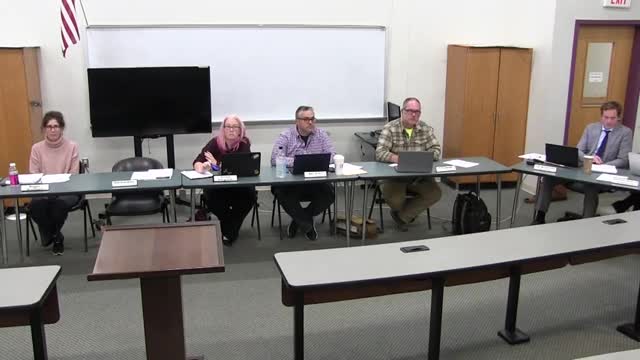North Brookfield school committee hears tuition-task-force findings, schedules next steps
Get AI-powered insights, summaries, and transcripts
Subscribe
Summary
The North Brookfield School Committee on a recent evening heard a Tuition Task Force presentation that summarized enrollment, comparative-district outreach and preliminary cost estimates connected to pursuing a tuition agreement for secondary students; the committee did not adopt any recommendation and asked for detailed financial proposals from potential receiving districts.
The North Brookfield School Committee on a recent evening heard a presentation from the district’s Tuition Task Force outlining background, enrollment data and next steps for studying a potential tuition agreement that would send junior–senior high students to another district rather than operate a local 7–12 program.
The task force presentation explained that a tuition agreement would be a contract between a “sending” and a “receiving” district, that DESE (the state Department of Elementary and Secondary Education) would have to approve any contract, and that the town would retain a K–6 district if the committee moved forward. The task force’s membership, as stated in the presentation, includes nine people from the community and school staff and residents who participated in meetings between June and October to gather information and hear options.
Why it matters: The committee has debated regionalization and other options for several years. School leaders said the district’s small enrollment and funding constraints limit course offerings, and the task force was convened to assemble facts the committee would need to decide whether to seek a long-term change in how secondary students are educated.
Key points from the presentation and discussion
- Task force purpose: The group’s stated role was to investigate the feasibility of tuitioning students out of North Brookfield’s junior–senior high and to provide factual information to the school committee; the task force did not make a binding recommendation. The presenters emphasized no final decision had been made.
- District contacts and comparisons: The task force reported outreach to two nearby districts that expressed interest (identified in the presentation as Quabog and Quabbin/Quabbin-area districts) and to a Massachusetts district that has operated under a tuition agreement since 1982 to study how that arrangement works in practice.
- Enrollment and choice-out figures (as presented): The presenters read a grade-by-grade enrollment breakdown for K–12 and said the district’s current 7–12 enrollment is about 119 students. They reported total students choosing out of North Brookfield at roughly 205 and said the district was receiving about $1,025,000 in tuition receipts (figures presented as preliminary and not yet certified by the state). The presentation said certified numbers for the current year were pending.
- Preliminary financial figures (presented as estimates): The task force presented a high‑level estimate that eliminating operation of the junior–senior high building could reduce operating costs on the order of $2,800,000 (a high-level figure the presenter said only reflected staffing and building operation). The group also listed a maximum one‑time unemployment cost estimate of $1,200,000 if positions were eliminated. The presenters cautioned that full proposals from potential receiving districts are needed to estimate the annual tuition cost and the net fiscal impact accurately.
- Potential benefits and risks raised in the presentation and questions: Presenters listed likely benefits for students if they moved—access to a wider course catalog, more AP classes, electives, athletics and extracurriculars. They also said potential disadvantages include job losses for local staff, loss of a local secondary building and the traditional lack of a voting seat for the sending town on a receiving district’s school committee unless negotiated in a contract.
Public comments and committee questions
- Damien Sorett, identified as Brookbrook and TGS Association president and a task-force member, said he participated in the task force but expressed concerns about process and access to information: “I am not in by no way, shape, or form am I in favor of closing this place down,” he said, and described difficulty attending some summer meetings and getting materials by Zoom.
- Margaret Hanson, identified as a special education aide, resident and taxpayer, urged the committee to be careful about moving students out. “I cannot support tuition and move the kids out,” she said, citing concerns about special education costs and the district’s unique qualities.
- Shailil Kair, a high-school special education teacher of 28 years, raised a frequent concern about special education placements: if a receiving district places a student in an out‑of‑district placement, the home town may be required to fund that placement; she described that outcome as unfair unless the contract addresses it.
Next steps and outstanding information
- The task force and school committee members agreed that the presentation was an information‑gathering step and that full financial proposals from potential receiving districts are required before any decision. The presenters proposed scheduling a special public meeting where officials from interested receiving districts could present detailed proposals and answer questions about tuition rates, transportation, credit transfers and special education arrangements.
- The presentation and several speakers stressed that DESE approval would be required for any tuition agreement and that a finalized agreement would need to be submitted in time for the district’s calendar if it were to take effect for the next school year; the presenter said one practical deadline to consider would be an April submission for the following school year.
- Committee members discussed forming a small negotiation subcommittee to work with central office staff and potential receiving districts to refine financial figures and contract terms before bringing any recommendation to the full committee.
What was not decided: The school committee did not vote to enter a tuition agreement or to close the junior–senior high. The task force did not present a final recommendation; presenters and multiple committee members said more numeric detail is necessary before the committee can make a policy decision.
Ending: Committee members said they will set public meetings to present district proposals, provide the community time to review materials, and return with more precise cost and program information before taking any formal action.
